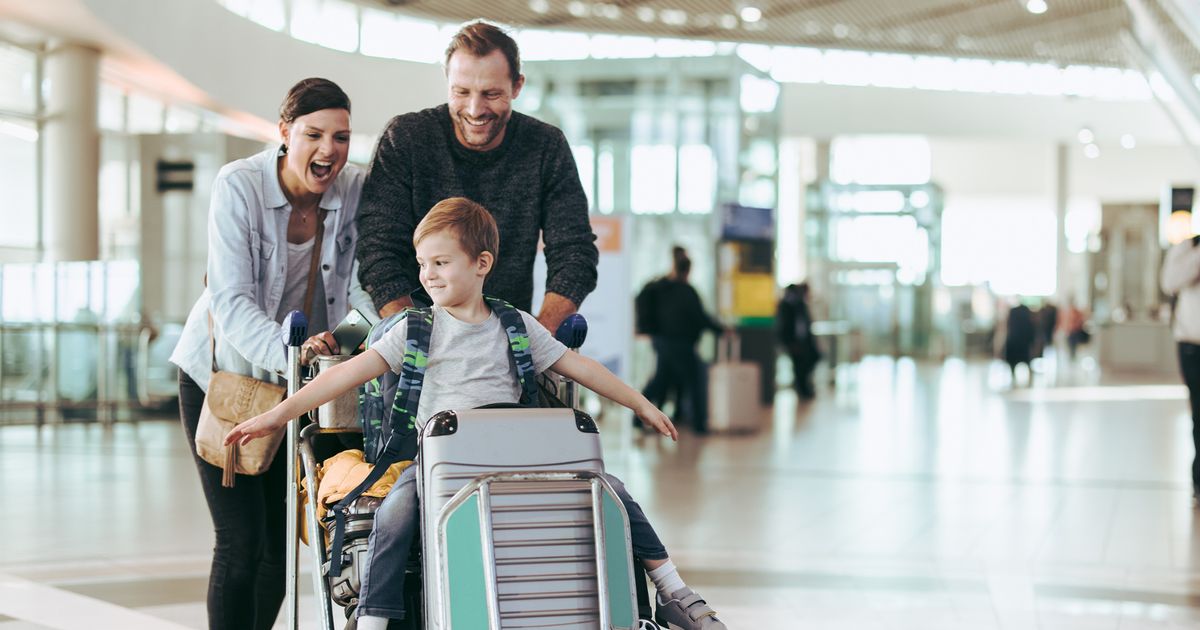Consumer rights expert Martyn James shares the latest “travel traps” you could fall into when holidaying this year – and explains how best to avoid them
Are you planning a getaway for Easter with the kids? Or maybe you’re thinking about a summer holiday to cheer yourself up after this unending rain we’ve all been suffering through.
I need holidays in my life. I long to stick on the out of office message, jump on a plane and begin a brand new relationship with some fabulous new city or destination. But I do tend to get a bit stressed out when planning and prepping for the vacation. That’s because one of the downsides about being a consumer rights campaigner and columnist is I’m only too aware of all the horrible things that can go wrong.
So in the interests of making your holiday as fabulous as possible, here’s my guide to the latest travel traps you need to watch out for.
Passport problems
When did you last renew your passport? If you’ve not checked and you’re going away soon, do it right now. I mean it, go and grab the passport immediately.
The news is full of stories this week about people who have been turned away at the boarding gates because they’ve fallen foul of a post-Brexit bureaucratic blip that means their passport has expired. It might seem like a small thing, but trust me. You will not get on a plane. My top TV travel expert mate, Simon Calder, estimates that a couple of hundred people get turned away every day as a result of this situation – over 100,000 each year.
Here’s the problem. One of the many perks of being in the EU was if you still had some months left on your passport when you renewed it, they were tagged these months to the new one. So if you had eight months at the point you applied for the new passport, it would display 10 years and eight months on the expiry date.
We are out of the EU now and as a result, this member’s only perk is gone. Your new blue passport will only give you a flat ten years. This is where it gets complicated. If you are travelling to the EU/Schengen area, your entry in to the destination country is based on your passport’s issue date, not it’s expiry date. It’s a subtle difference but a major one.
Say, for example, you are travelling on 01 June 2024 and your passport expiry date is 01 July 2024 you might think you are okay. But if your passport issue date is 01 May 2014, then you’ll be turned away because your passport is over ten years old and has expired.
Hold on to your sun hats, because that’s not all. You must also have at least three months extra to run on your passport before it expires. So if your issue date is 01 May 2014, it expires 01 May 2024. So the latest you could have left an EU/Schengen country would have been 29 February 2024.
I know, I know. My head hurts too. In short, check the issue date on your passport and add on 10 years. Do you leave your holiday destination three months before that date? if so, great. If not, get an emergency passport right now!
Some countries have even more restrictive passport policies. Others don’t care so much. If in doubt check the Foreign Office website – and remember you might need a visa for many countries too.
Currency crisis
In the excitement of holiday planning, we often overlook buying travel money or don’t think about how we will pay for things. But you’ll pay a hefty price for not doing so.
I’ve researched and tested the many options for travel money and I’ve found that travel debit cards – plastic cards that link to your bank card – are the best way to spend as they provide consumer protection, offer the best currency conversion rates and often don’t charge fees. I am hooked on my Currensea card whenever I go away on holiday. I even get a daily rundown of what I’ve spent and how much I’ve paid in pounds too.
But no business gets a free plug in this column without doing some work! So I asked Currensea to do some research for me on how expensive other methods of payment can be.
Top (bottom) of the list is buying money at the airport. Never do this! And don’t sell the money back there at the end of the trip either. Currensea’s research found that families are losing around £320 million each year by buying cash at the airport at poor rates. That’s an average of £76 per family, and it’s all thanks to rubbish exchange rates. Yet 36% of parents still turned to airport exchanges for their travel money and 58% admitted it was because they’d left it till the last minute.
Next up, high street bank debit cards. Currensea found that the average family pays £212 in fees and currency conversion from using high street bank debit cards and £188 for using pre-paid currency cards. You could get an extra day’s holiday for that!
Many high street banks charge huge fees for every single transaction you make. Some of the challenger banks have much better currency conversion deals, but check before you travel. You can get some specific travel credit cards that have great rates – but never use them to withdraw cash. Oh, and always pay in the local currency for the best rates.
Travel insurance quirks
A good travel insurance policy is essential when traveling. Buy one as soon as you book the holiday – but shop around for the best deal and watch out for a few of these quirks.
Recently, I’ve been flooded with complaints from people who have had claims rejected after ‘overstaying’ while on vacation. This is because most annual and single trip insurance policies set a limit of 30 days for each holiday – something the vast majority of people don’t realise. You can extend this for a fee, for up to 90 days.
Another OMG fact that catches out holidaymakers comes when you leave luggage with a hotel when you check out. Should your bag be robbed or rifled through while in the hotel’s storage space, your insurance policy is unlikely to cover you. That’s because letting the bag out of your sight is technically a breach of contract. Also, have a think about whether you really need to take all those valuables with you. If you pack a laptop, phone, tablet, smart watch and gaming system, you could be carting about £5,000 worth of property alone. So check the limits for valuables and for holiday cash.
If you’re planning anything with even a hint of risk then take out adventure sports or winter sports cover. You’ll definitely need it if you’re going quad biking (responsible for many a ruined holiday). But even off-road hikes and banana boat rides can be excluded with some of the cheaper policies. It doesn’t cost much to add on this cover if you’re the spontaneous type.
And finally, check the ‘key facts’ document so you know what the policy limits are, how soon you have to report incidents and the main exclusions. And save that emergency number in your phone too.
Overpriced airlines
You didn’t think I’d miss this one, did you?! Airlines are getting a bit silly with their additional charges these days. If you’ve not travelled for a year or two, then bear in mind that the cheaper airline flights double in price when you’ve added on only the essential extras.
Many airlines have started charging for cabin bags now, as well as hold luggage. There have also been major price hikes for other essential components of your flight too. Hold baggage charges seem to get pricier with some airlines the close you get to travel. A particular bugbear of mine is how airlines force us to pay to choose seats (essential if you’re travelling with family).
I’ve also heard a range of complaints about airlines that have started ‘bundling’ these add-on charges in to packages, which are often unclear and complicated, so it’s hard to know if they are value for money. The Civil Aviation Authority (CAA) publishes comparison tables of airline charges, but because of things like surge and variable pricing, they often don’t bear much relation to reality.
So when you book, assume that you’ll have to add on additional charges. Using my most recent flight booking as an example, I’d suggest that you’ll need a hold bag (£30 each way), cabin bag (£25 each way) and an allocated seat (£7). That’s £62 to add on to each flight or £124 for a return. However, some airlines don’t overcharge for extras, so don’t write off pricier flights if bags and seats are included in the price.
Martyn James is a leading consumer rights campaigner, TV and radio broadcaster and journalist.










